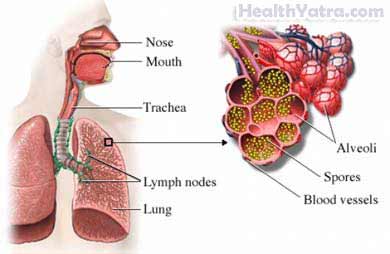Definition
Anthrax is an infection caused by bacteria. It can be life-threatening.
There are three forms of human anthrax, depending on where anthrax enter the body:
- Inhaled—from breathing airborne spores into the lungs
- Cutaneous (or skin)—due to spores entering a cut or break in the skin (most common)
- Gastrointestinal—from ingesting spores in raw or undercooked food
Once anthrax is in the body, it multiplies and releases toxins. The toxins cause swelling, bleeding, and tissue death. All forms of anthrax can cause death but inhaled anthrax has a much higher mortality rate once symptoms develop.

Causes
Anthrax is caused by exposure to a specific bacteria or its spores. These spores are created by the bacteria and can survive in the environment for decades. The bacteria and spores can be found in the soil and livestock like cattle and goats. It is rare but people can contract anthrax from:
- Infected animals
- Infected animal products
- Spores in environment
Risk Factors
Risk factors for anthrax include the following:
- Working in a laboratory with anthrax bacteria
- Working with anthrax-infected animals or their products (eg, at a farm, leather tannery, woolery, veterinary clinic)
- Exposure to criminal acts or biologic terrorism
Symptoms
Symptoms usually start within a few days of exposure. They vary depending on the type of disease.
Inhalation Symptoms
Inhalation anthrax symptoms occur in stages over several days. It may start with cold or flu symptoms such as:
- Cough
- Fatigue
- Weakness
- Fever
- Chills
- Headache
- Muscle aches
Sometimes a brief period of seeming recovery will occur followed by rapid onset of:
- Severe difficulty breathing
- Chest pain
- Sweating
- Shock
- Delirium
- Death
Cutaneous Symptoms
Symptoms may occur in stages:
- Raised bump, like an insect bite, that is itchy and round
- Raised area opens, forming an ulcer with a black area in the center and producing drainage of clear or pinkish fluid
- Swelling around the wound
- Swollen, painful lymph nodes
Gastrointestinal Symptoms
These symptoms will depend on the location of the lesions. Mouth and throat lesions can cause:
- Swelling in throat
- Swollen lymph nodes
- Sore throat
Lesions in the intestines can cause:
- Nausea
- Vomiting
- Fever
- Abdominal pain
- Bloody diarrhea
Diagnosis
The doctor will ask about your symptoms and medical history. You will be asked about potential sources of exposure. A physical exam will be done.
Fluid from wounds, mucosal membranes, and body fluids may be tested for bacteria. A blood test may be done to look for the presence of antibodies to anthrax.
If inhalation anthrax is suspected, your doctor may order a chest x-ray to examine your lungs.
Treatment
It is important to start antibiotics early. Any delay greatly increases the risk of death especially with inhalation anthrax. Treatment may be started with IV medications followed by oral antibiotics. You may need to take antibiotics for many weeks.
If you have skin lesion, they will be carefully cleaned and dressed with bandages.
Public Health Measures
Finding the source of the anthrax is very important. Public health officials will check places where a patient lives and works. Contaminated surfaces should be disinfected. Other people who may have been exposed will be tested. They may be given preventative antibiotics.
Prevention
It is difficult to tell if you have been exposed. Anthrax is colorless and has no smell or taste. Seek medical care if you suspect that you have had contact with anthrax. Antibiotics may be able to prevent infection following exposure. There is a vaccine to prevent anthrax. It requires multiple shots and is only partially effective. The vaccine is not recommended for the general population. It is routinely given to military personnel.
Strategies to prevent exposure to anthrax include:
- Avoid contact with infected animals or animal products.
- Do not touch fluid draining from an anthrax wound.
- Handle suspicious mail properly:
- Do not open mail from an unknown source.
- Do not shake packages.
- Do not smell or taste contents.
- Put the parcel down and immediately wash your hands with soap and warm water.
- Call local law enforcement.
Anthrax Treatment in India – Page Keywords:
Anthrax Definition, Anthrax Definition Causes, Anthrax Symptoms, Anthrax Treatment in India, Anthrax Treatment Cost in India, Anthrax Surgery Cost, Top Anthrax Treatment Hospital, Top Anthrax Treatment Doctor in India, Anthrax Meaning in Marathi, Anthrax Treatment Near me, Anthrax Complications, Travel India for Anthrax Treatment, Anthrax Treatment in Arab Countries, Anthrax Treatment in Bangladesh, Anthrax Treatment in Dhaka, Anthrax Meaning in Bengali, Anthrax Meaning in Arabic, Anthrax Meaning in Hindi, Anthrax Treatment in Bahrain, Anthrax Treatment in Egypt, Anthrax Treatment in Iraq, Anthrax Treatment in Jordan, Anthrax Treatment in Kuwait, Anthrax Treatment in Lebanon, Anthrax Treatment in Saudi Arabia, Anthrax Treatment in United Arab Emirates, Anthrax Treatment in Sudan, Anthrax Treatment in Tunisia, Anthrax Treatment in Nepal, Anthrax Treatment cost,
